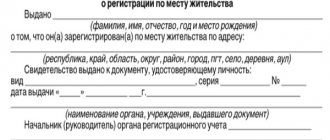Statement of claim to determine the child’s place of residence
In __________ district court of Arkhangelsk Address: _________________________________
Plaintiff: _________________________________ Address: _________________________________
Respondent: ______________________________ Address: _________________________________
Third party: Guardianship and trusteeship authority
___________________ districts of Arkhangelsk
Government duty: ________________
STATEMENT OF CLAIM to determine the child’s place of residence
"__" ________ 20____ between me _____________________ and the Defendant __________________ a marriage was registered (or were in an actual marital relationship). From this marriage we have a common minor child (child’s full name, date of birth) He is now ___ years old. Since “__” ________ 201__, the marriage relationship between me and the Defendant has actually been terminated, there is no common household. The marriage is dissolved (not dissolved). The child lives with the Defendant. I believe that the defendant’s financial situation and moral and psychological climate do not provide adequate conditions for the maintenance and upbringing of a child, which is expressed in the following: (give examples of improper maintenance and upbringing of a child). This is confirmed by the following: ______________________________.
At the moment I have a permanent income, which is ______________ rubles. per month. Thus, if the court determines the child’s place of residence with me, he will not need anything financially. Housing conditions are also suitable for the upbringing and harmonious development of the child. The total area of the apartment is ____________ sq.m., the child will have his own room. There is all the necessary furniture for a child, many toys, educational games and books. The specifics and schedule of my work allow me to spend a lot of time with the child, paying the necessary attention to his moral and physical development. We have developed a very good and trusting relationship with the child. He likes to be with me, he thinks that I have him at home. I repeatedly appealed to the defendant with a request to transfer the child to me to raise, but received a refusal (did not receive an answer). According to Part 3 of Art. 65 of the Family Code of the Russian Federation, the place of residence of children in the event of separation of parents is established by agreement of the parents. In the absence of an agreement, the dispute between the parents is resolved by the court, based on the interests of the children and taking into account the opinions of the children. In this case, the court takes into account the child’s attachment to each of the parents, brothers and sisters, the child’s age, moral and other personal qualities of the parents, the relationship existing between each parent and the child, the possibility of creating conditions for the child’s upbringing and development (occupation, work schedule of the parents , financial and marital status of parents, etc.). Based on the above, guided by Part 3 of Art. 65 of the Family Code of the Russian Federation,
ASK:
Didn't find the answer to your question?
Call our lawyer!
Arkhangelsk:
, +7 902-286-15-16
Saint Petersburg:
+7 981-761-00-72
Determine the place of residence of the child (full name and date of birth of the child) with (full name of the plaintiff) at the address: _____________________________. Appendix: 1. Copy of the statement of claim 2. Receipt for payment of the state duty 3. Certificates from the place of work on the average salary for the last 3 months 4. Certificate from the Plaintiff’s place of residence 5. Documents about the child’s location 6. Copy of the child’s birth certificate ______________ /____________/
Share this material on social networks
Where is the claim filed?
Claims regarding disputes regarding the residence and upbringing of children are considered exclusively by district and city courts. Even if, along with this demand, a divorce or a claim for alimony is filed within the jurisdiction of the magistrate.
The law does not prohibit an applicant from combining several claims in a document, but the dispute over children becomes key in determining jurisdiction.
Geographically, filing is carried out at the place of residence of the defendant, but with one exception: if a minor child lives with the applicant, then he has the right to file a claim at his place of residence.
In order to exercise the right to file an application at the place of residence, the parent will need to provide the court with the relevant evidence:
- a copy of the passport with a note about the child;
- an extract from the house register about the child’s registration at the parent’s place of residence;
- a certificate from the street committee or from the Criminal Code confirming that the minor lives with his mother or father at the specified address.
This will be enough for the applicant to get rid of the need to travel to another city to consider the case.
Parents' right to children after divorce
In the event of a divorce with children, the father and mother retain all rights and obligations and are equally responsible. If one parent living with a minor prevents communication with the other, then there is a violation of the rights to communication.
Officially established representatives of a minor after a divorce are authorized to:
- choose a first name, last name and patronymic;
- communicate (including communication with other family members on your side);
- participate in daily life while living apart;
- choose a place of study and form of education;
- determine leisure time (faculties, clubs, sections);
- introduce to religion and more.
The main criterion for the exercise of parental rights is the priority of children's interests.
In the matter of determining the place of residence of a minor, the father and mother are equal parties for the court. Therefore, the decisive factor is the circumstances characterizing the further living conditions and upbringing of the minor, and the opinion of the guardianship authorities.
In case of divorce, the child retains the following rights:
- for housing (Article 31 of the Housing Code of the Russian Federation);
- communication (Article 55 of the RF IC);
- personal property;
- material maintenance (payment of alimony, Article 60 of the RF IC);
- own opinion (Article 57 of the RF IC).
What you need to pay attention to
The claim must indicate that one of the parents must transfer the child, whose place of residence is determined by the court, to the parent with whom the child will live. It is important to confirm this requirement directly in court, so that the court does not forget to indicate this obligation in the operative part of its decision.
Otherwise, it is possible that a problem may arise when trying to enforce a court decision, including with bailiffs, if the parent refuses to hand over the child voluntarily.
Forensic psychological and psychiatric examination
The court has the right to involve in the consideration of a civil case, at its discretion, any specialists - teachers, psychologists, other persons, whose professional opinion will help the court make the right decision. A forensic psychological and psychiatric examination is often prescribed. Both the child and the parents, or only one of them, can be examined by a specialist.
An examination in relation to a child establishes which parent the child is more attached to, with whom he feels more comfortable, and what are the psychological characteristics of the minor, which the court must take into account.
The examination of parents generally comes down to clarifying the question of how much the psychological influence of the parent corresponds to the interests of the child and the possibility of living with him.
Questions to the expert must be formulated by the parent who submits a petition for such an examination, regardless of whether he is the plaintiff or the defendant. The same parent must name the specific expert institution that should conduct this examination and indicate its address.
The examination is paid. The person who announced the examination and pays for it. The cost of such an examination may vary depending on the region, but on average it is approximately 40,000 rubles . You can find out which institutions in your locality carry out such examinations on the Internet.
Such an examination is important if the court determines the place of residence of a child who is under 10 years of age. Since his opinion is not necessarily clarified by the court.
You have the right to ask any questions to the psychologist who will conduct the examination, but they usually boil down to the following:
- what are the individual characteristics of the minor, his psychological and emotional state, what are the defining traits of his character;
- how much he loves each of his parents, how such affection is generated and determined;
- what are the child’s relationships with other family members, as well as the degree of his closeness with them;
- does the child know that there are conflicts between parents, on what basis they arise, and what is their cause;
- living with which parent will be least traumatic for the child’s psyche;
- what order of communication between the child and his parents (one of them) is preferable for him.
If a petition has been filed in the case for a psychological and psychiatric examination of the parents, or one of them, it is necessary to find out:
- whether the parents have any psychological or other characteristics that may interfere with their communication with the child;
- whether one of the parents can have a negative influence on the minor;
- how this influence will affect the child’s psyche;
- what is the attitude of the parents towards the child;
- whether the parents show signs of aggression towards the child.
If the request to appoint an expert examination is granted, the court issues a ruling on its appointment, clarifies and formulates questions that need to be answered by the expert, and sends the materials of the civil case to the appropriate expert institution. During the examination, the determination case is suspended.
The role of children's age in divorce
A factor that requires the attention of the court during the divorce process is the age of the joint children. If the spouses have not entered into an agreement, the court considers the family dispute according to the following rules:
- Divorce with a pregnant woman or with a child under 1 year of age is provided only with the consent of the spouse. The husband's claim, when the wife is against it, will not be accepted for proceedings;
- the collection of alimony in favor of the child and ex-wife is established by the court if the mother is on leave to care for a child under 3 years of age;
- the presence of an adult child makes it possible to dissolve the marriage in the registry office, provided that there is no property dispute.
In accordance with Art. 57 of the RF IC, children have the right to express their own attitude to the solution of any family issue that affects their interests. The opinion of a child over 10 years old must be taken into account. But the outcome of the case may not coincide with his desire due to an objective rather than subjective approach.
The process of calling a minor and questioning in the courtroom is carried out with the permission and under the control of a representative of the guardianship authority and the teacher.
Consideration of the case by the court
The court will evaluate all evidence at the trial. If the child is already 10 years old, he will listen to the child’s opinion. It is important to exclude any psychological pressure in the child’s decision-making.
If the child lives with a parent who is a defendant in the case, it is correct to exercise his right to file a counterclaim or defense. The application must also be accompanied by evidence that living with the defendant will be more comfortable for the child. The material component is certainly important. But it doesn't play a key role.
It is the child’s attachment to the parent that should be a priority in the court’s decision to determine the child’s place of residence with one of the parents. The court examines how much personal time is given to the child, what is the nature of sharing, participation in education and interaction with teachers (educators).
In court, a party to the case may file a petition to order a forensic examination, to call witnesses, or to request information from medical institutions or the police department about the characteristics of one of the parents.
A decision on a claim to determine a child’s place of residence can be enforced, but this is fraught with difficulties, for which you need to be prepared.
Who is the child most often left to live with?
Practice shows that in most cases the child remains with the mother.
This is primarily due to the fact that children are usually attached to their mother, because they show great care and concern.
The second reason is that the financial situation of mothers is no worse than that of fathers, if only because everything acquired during marriage is common joint property.
Even if the father is wealthier, a greater level of material security is not decisive. The level of provision must be reasonably sufficient. These are objective reasons.
We recommend! The ex-wife forbids and does not allow seeing the child after the divorce, how to solve the problem and where to turn
Subjective reasons lie in the generally accepted position that mothers take great care of their children, and also in the fact that, as a rule, this category of cases is considered by female judges.
However, there are cases when children stay with their father.
This usually happens when the mother is unable to provide for the maintenance and upbringing of the children.:
- Does not have living conditions for children (housing, source of income) and does not take any action to support them.
- Suffering from alcoholism or drug addiction.
- The child has a great attachment to his father, which is why a psychological and psychiatric examination is needed, but there is no attachment to his mother or it is weak.
And also if the child is over 10 years old, and he asks to leave him with his father, and the mother does not have any advantages. Everything here is very individual.
Regulatory regulation of the issue of establishing a child’s place of residence
The issue of establishing the place of residence of minor children after the parents’ divorce is regulated by the Family Code of the Russian Federation dated December 29, 1995 No. 223-FZ. Art. is mainly devoted to this issue. 65 RF IC.
The Supreme Court of the Russian Federation adopted Resolution of the Plenum of May 27, 1998 No. 10 “On the application of legislation by courts in resolving disputes related to the upbringing of children” (hereinafter referred to as PPVS No. 10)
There is also a “Review of the practice of courts resolving disputes related to raising children,” approved by the Presidium of the Supreme Court of the Russian Federation on July 20, 2011 (hereinafter clarified by the Supreme Court).







